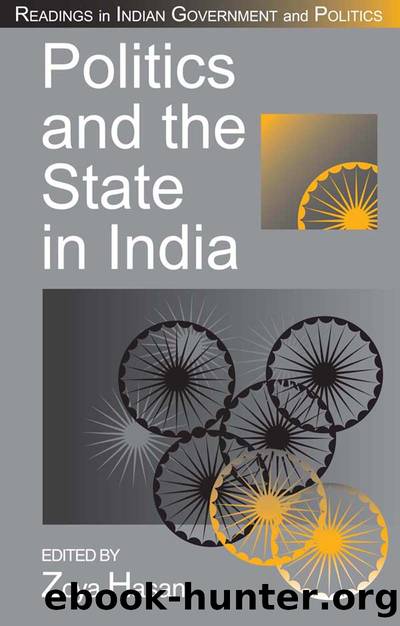Politics and the State in India (Readings in Indian Government and Politics series) by Unknown

Author:Unknown
Language: eng
Format: azw3
Publisher: SAGE Publications
Published: 2000-11-02T05:00:00+00:00
A Crisis of Values
This was one aspect. No less important was the nature of leadership and its capacity to instil in the system a set of values, norms of behaviour and rules of the game. The role of Gandhi in providing a pace-setting personal example and diffusing moral standards based on indigenous symbols and identities is well known. This was followed by Nehru, who personally shaped the post-Independence political system, provided it with a set of basic norms and values which he constantly reiterated in his role as the nation's schoolmaster, and enabled the system to bear the loads of an expanding framework of political participation, economic and social mobilization, and open competition and criticism.
But Gandhi also created dozens of smaller Gandhis, and although Nehru lacked Gandhi's talent of self-reproduction and freedom from any sense of insecurity, and Patel did not live long enough, several Nehrus and Patels came into being under the system of which Jawaharlal Nehru was only the chief operator. All over the country, outstanding individuals came to the fore and provided a dominant style of leadership for a considerable length of time. Their word was law, they consolidated political machines encompassing large territories on the basis of support networks they built, penetrated a wide array of both traditional and developmental institutions and constantly mediated in disputes and differences. But, above all, they imbued politics with an ethical code and imparted to it the concept of ‘service’, of duty, of the Gandhian emphasis on dharma. Central to the moderation of state power is this insistence on a larger ethical code without which politics is bound to degenerate into a cold and cynical exercise in control and manipulation, and ultimately its takeover by musclemen and mafias. This is what has happened over the last few years.21
In the ultimate analysis, Gandhi was right that politics and religion are closely intertwined. Either the state is an instrument of morality, or it is made into an instrument of some positivist force, be it progress or national glory or the glory of a person who is supposed to personify the destiny of the whole people. Whenever the state is shorn of the moral imperative and the nuances and controls that go with it, it becomes totalitarian—no matter what its legal constitution be.
Download
This site does not store any files on its server. We only index and link to content provided by other sites. Please contact the content providers to delete copyright contents if any and email us, we'll remove relevant links or contents immediately.
| Africa | Americas |
| Arctic & Antarctica | Asia |
| Australia & Oceania | Europe |
| Middle East | Russia |
| United States | World |
| Ancient Civilizations | Military |
| Historical Study & Educational Resources |
Magic and Divination in Early Islam by Emilie Savage-Smith;(1533)
Papillon by Henry Charrière(1430)
Bohemians, Bootleggers, Flappers, and Swells: The Best of Early Vanity Fair by Bohemians Bootleggers Flappers & Swells- The Best of Early Vanity Fair (epub)(1403)
Ambition and Desire: The Dangerous Life of Josephine Bonaparte by Kate Williams(1388)
Twelve Caesars by Mary Beard(1315)
Operation Vengeance: The Astonishing Aerial Ambush That Changed World War II by Dan Hampton(1162)
What Really Happened: The Death of Hitler by Robert J. Hutchinson(1161)
London in the Twentieth Century by Jerry White(1146)
The Japanese by Christopher Harding(1131)
Time of the Magicians by Wolfram Eilenberger(1126)
Twilight of the Gods by Ian W. Toll(1117)
Lenin: A Biography by Robert Service(1075)
The Devil You Know by Charles M. Blow(1024)
A Social History of the Media by Peter Burke & Peter Burke(976)
Freemasons for Dummies by Hodapp Christopher;(964)
Napolean Hill Collection by Napoleon Hill(942)
Henry III by David Carpenter;(919)
The Rise and Triumph of the Modern Self by Unknown(913)
Richard III (The English Monarchs Series) by Charles Ross(908)
